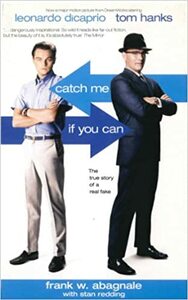Take a photo of a barcode or cover
adventurous
funny
lighthearted
medium-paced
Fun story where watching movie first led me to this book. In the movie, Frank’s cons seemed to work because of his charm & luck. The book details his research, lots of research to make his cons work.
Frank loved the ladies so some readers may find his sexist word choices & attitudes objectionable.
The audiobook version I have does not have an epilogue. It just ends abruptly😮💨 I really wanted details on his career after his cons.
While I was looking up different editions of this book, I also read that Frank’s story doesn’t hold up.
Details like his being in a US prison from ages 17-20, which is when a great many of his exploits take place, ruin his alleged timeline of cons. Doesn’t seem like he ever worked for the FBI either.
Looks like Frank had one good laugh with a final con on readers and movie goers alike.
Frank loved the ladies so some readers may find his sexist word choices & attitudes objectionable.
The audiobook version I have does not have an epilogue. It just ends abruptly😮💨 I really wanted details on his career after his cons.
While I was looking up different editions of this book, I also read that Frank’s story doesn’t hold up.
Details like his being in a US prison from ages 17-20, which is when a great many of his exploits take place, ruin his alleged timeline of cons. Doesn’t seem like he ever worked for the FBI either.
Looks like Frank had one good laugh with a final con on readers and movie goers alike.
As an audio book, I really enjoyed this. I did not see the movie and I was blown away by his antics. I am currently reading the Psychopath Test and I could not help thinking he was a sociopath. It was amazing what he did. Engaging book.
adventurous
funny
hopeful
fast-paced
second half was a slog to get through. and i'm wondering how true all of this was...
The story's interesting but the guy really goes all out coming up with as many kitschy ways he can to refer to bouncing checks. And he makes a big deal about being a ladies man and chasing the ladies (always a topic of literary interest) but doesn't describe any of the long line of his female interests in terms more descriptive than "gorgeous blonde" or "lovely brunette with long legs", let alone describe his actual conquests.
The ending was also kind of a let-down. Thought it would go a little farther into his life, beyond just him and his exploits as a criminal.
The ending was also kind of a let-down. Thought it would go a little farther into his life, beyond just him and his exploits as a criminal.
love the movie but i just truly do not care about the book
Confession: I didn’t actually finish the book, I bailed 49% of the way through, after I read the Wikipedia article about the author. It turns out this book is basically a work of fiction. Prior to learning that, I was enjoying reading it. Very entertaining and a unique voice. However, now that I know most of it is fabricated, reading it feels pointless.
I started this and put it down for a really long time - and while it picked up after a while, finishing it made me understand why it took me so long to get into.
The capers are interesting (Abagnale notes that most people imagine what it would be like if they took up a life of crime), though the narrative makes clear that a) he would have been caught more quickly today with the advance of technology and b) as a straight white man with lots of funds, he was in a prime place to abandon his life and start his new one. Many if most people could never do what he did.
And his privilege combined with the author interview at the back rubbed me the wrong way: Abagnale argues that airlines should increase profiling so people like him do not have their time wasted. In this case, Abagnale is referring to his life after crime, but it exemplifies the main theme of the book: Abagnale would have not made it as far as he did had he not been a white man. This was a key feature that allowed people to trust him and especially for him to fake his way through being a pilot, doctor, lawyer, and etc. Marginalized groups have to fight to be even taken seriously at a basic level, and there are undertones of racism when Abagnale argues that he should not be subjected to profiling at airports. There's an odd hypocrisy that this man, who was once the greatest con artist in the world, should not be profiled, because he "doesn't seem" like the type of person to make trouble. It really speaks to his privilege and spoiled what little of the book I did enjoy.
In the interview, Abagnale also argues that technology makes crime easier, which is an incomplete argument re. just how complex technology is. I agree that crime has changed since the advancement of technology, but I don't think it can be easily summed up in an "the internet is bad" statement. There are a lot of takes on both sides.
Generally throughout the book, I didn't enjoy it because Abagnale is a complete douchebag. He cons everyone he meets save for one, a man who bailed him out of jail. Others (a sex worker, a government official who helps him reduce his sentence, etc.) are thrown out to the wind as soon as Abagnale has what he wants.
And while I recognize the book was published in 1980, it's extremely dated in regards to how Abagnale talks about women. Women are constantly objectified throughout the memoir to the point that as a feminist, I would have trouble recommending this to anyone. It reminded me of Fem Script Intros, which highlights how often women are objectified in their basic descriptions to the audience. That's exactly how Abagnale writes - it's always about how they look and what they can do for him.
The only part of this that I liked were the bits about crime that I think most people would enjoy, especially with the "imagining what your life would be like as a criminal" aspect. The rest was abominable and I couldn't stand it.
The capers are interesting (Abagnale notes that most people imagine what it would be like if they took up a life of crime), though the narrative makes clear that a) he would have been caught more quickly today with the advance of technology and b) as a straight white man with lots of funds, he was in a prime place to abandon his life and start his new one. Many if most people could never do what he did.
And his privilege combined with the author interview at the back rubbed me the wrong way: Abagnale argues that airlines should increase profiling so people like him do not have their time wasted. In this case, Abagnale is referring to his life after crime, but it exemplifies the main theme of the book: Abagnale would have not made it as far as he did had he not been a white man. This was a key feature that allowed people to trust him and especially for him to fake his way through being a pilot, doctor, lawyer, and etc. Marginalized groups have to fight to be even taken seriously at a basic level, and there are undertones of racism when Abagnale argues that he should not be subjected to profiling at airports. There's an odd hypocrisy that this man, who was once the greatest con artist in the world, should not be profiled, because he "doesn't seem" like the type of person to make trouble. It really speaks to his privilege and spoiled what little of the book I did enjoy.
In the interview, Abagnale also argues that technology makes crime easier, which is an incomplete argument re. just how complex technology is. I agree that crime has changed since the advancement of technology, but I don't think it can be easily summed up in an "the internet is bad" statement. There are a lot of takes on both sides.
Generally throughout the book, I didn't enjoy it because Abagnale is a complete douchebag. He cons everyone he meets save for one, a man who bailed him out of jail. Others (a sex worker, a government official who helps him reduce his sentence, etc.) are thrown out to the wind as soon as Abagnale has what he wants.
And while I recognize the book was published in 1980, it's extremely dated in regards to how Abagnale talks about women. Women are constantly objectified throughout the memoir to the point that as a feminist, I would have trouble recommending this to anyone. It reminded me of Fem Script Intros, which highlights how often women are objectified in their basic descriptions to the audience. That's exactly how Abagnale writes - it's always about how they look and what they can do for him.
The only part of this that I liked were the bits about crime that I think most people would enjoy, especially with the "imagining what your life would be like as a criminal" aspect. The rest was abominable and I couldn't stand it.
Like most, I saw the movie first, and this account was of course different, but almost more fascinating. It is told in first person and Abagnale goes into details on how he gleaned information from unsuspecting people in order to build his cover. I was just fascinated the whole way through. This book actually inspired me as a person to be persistent and chase my dreams.
Listened to the audiobook version of this story. Fascinating story, and based on truth, but I guess there is a decent amount of exaggeration in the story. From his website, Frank Abagnale himself comments "I wrote the book, Catch Me If You Can, more than 23 years ago. Obviously, this was written from my perspective as a 16-year old with the help of a co-writer (I'm now 54 and I sold the movie rights in 1980). I was interviewed by the co-writer only about four times. I believe he did a great job of telling the story, but he also over dramatized and exaggerated some of the story. That was his style and what the editor wanted. He always reminded me that he was just telling a story and not writing my biography." Even so, it is unbelievable how he was able to pull the same con on so many people. You would never get away with a con like that in today's connected world.






